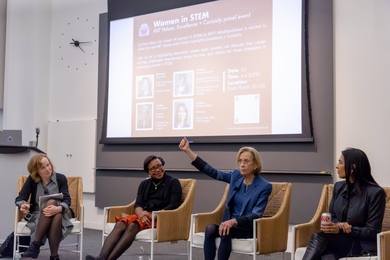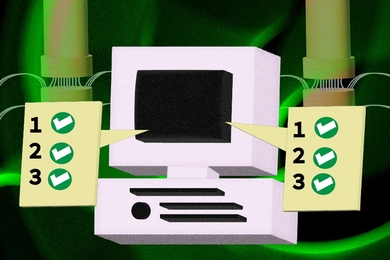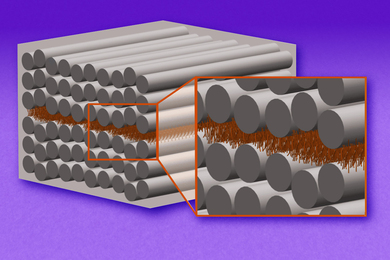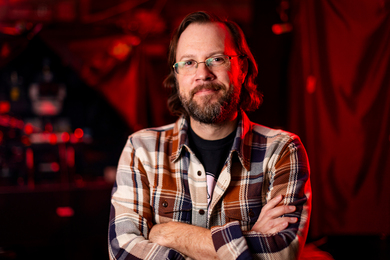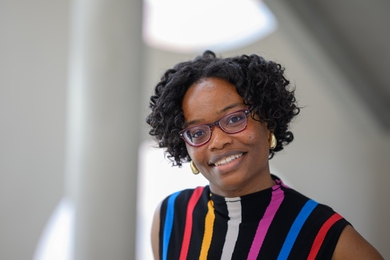It took two years for Paris to come back to normal after terrorists exploded a series of 20 bombs in its subways in 1995-96, said an MIT student from Morocco who narrowly missed being a victim of those terrorists.
The trauma of terrorism, the fear of blind nationalism, MIT as home and refuge, and hatred of the United States were topics discussed with passion Monday evening at "International Student Perspectives," a teach-in attended by about 150 students.
The Moroccan student described the day he ran to catch a subway in Paris. The next train, the one he would otherwise have taken, blew up minutes later in an Algerian terrorist attack. "If I hadn't raced for that train, I would not be here with you today," he said.
The World Trade Center tragedy affected him deeply. He worried about friends who worked there (all survived). His mother was worried too. "When my cell phone began working again, I found that she had left me 17 messages," he said.
"I am both Arab and Muslim. I am disgusted that people of my faith would do this," the Moroccan said.
The organizers of Monday's teach-in requested anonymity for the international students to foster a free exchange of views. It was the second of a series of six teach-ins being held in Room 26-100 to talk about the Sept. 11 attacks.
A Pakistani woman, a senior in political science, said the Osama bin Laden organization, Al Qaida, made three demands: that the United States leave Saudi Arabia, settle the Arab-Israeli dispute, and stop supporting "corrupt regimes" in Arab countries.
She said America gave the weapons of terrorism to the Afghans who fought the Soviet Union's invasion. "The U.S. gave them guns and said, 'Go do my job for me.'" The United States should have taken the weapons out of the hands of the Afghans at the end of the war with the Soviet Union in 1989, she said.
FLAG-WAVING
A student born in Burma criticized the media for calling the tragedy "Attack on America." He said, "It was more a mass murder than an attack on a country. The murder part is much more important."
He was upset that the American flag "was flying everywhere. Maybe it wasn't meant to be nationalistic," but it felt that way. A member of the audience asked him, "How does that offend you?" The Burmese man said people from other nations "feel excluded and intimidated."
"Why are we waving this flag when people have died? Why not just wear black?" said a woman panelist, who was born in America and has lived in two African countries.
A woman old enough to be in the 1960s protests stood up, displaying her black T-shirt and the white peace symbol of the Campaign for Nuclear Disarmament. "This is the flag I'm wearing," she said.
One student called this a universal tragedy, not an American one, but a panelist from Israel disagreed. "It was an attack on America, on American soil, on a symbol of capitalism, an American symbol ... We can sympathize; we are all human," she said.
PATRIOTISM OR NATIONALISM?
"I think it's OK for Americans to wave the flag, but they should know whether it's patriotism or nationalism," a woman student from Pakistan said. "Nationalism is blind, unquestioning loyalty" to whatever is being done by a government. "Patriotism is a principled loyalty, a loyalty to the principles of a nation such as the Bill of Rights."
A black woman panelist from Ohio said, "I'm an American and I'm very disturbed by the excessive waving of flags. America is not all good."
One of the most ironic sights, said an Asian-American male student, was a display of three American flags in front of an Afghani restaurant in East Cambridge.
Professor Isabelle de Courtivron of the foreign languages and literatures section, who moderated the panel with Dean Philip Khoury of the School of Humanities, Arts and Social Sciences, counseled the audience to talk about the "United States" of America, not simply America.
ROTC
An American man, who has been a member of ROTC and whose parents were in the military, said a number of close friends may soon be in a situation putting them "in harm's way. They are intelligent people who are well aware that this country is not perfect. But it's better than anything else," he said.
"The flag is a symbol of freedom and inclusiveness," he said. "I think most Americans do know that America is a nation of immigrants."
War is the term people use as a generalized action, "like the war on drugs." He said, regretfully, "We don't have a better word for what we are doing."
MIT IS HOME
"I consider MIT my home. I don't consider the U.S. my home," said the native of Burma who has also lived in Africa, adding that the international character of MIT felt comfortable.
A French Muslim woman who spent many years in Morocco said, "Unfortunately, I have graduated from MIT. I was proud to come to MIT" because of its international character and tolerance.
Now she is looking for a job and was dismayed when she was told by a career counselor, "'Maybe you should take off your resume that you speak Arabic.' I'm out of MIT pretty soon," she said worriedly, expressing fear "that people have been attacked at mosques."
The Moroccan man commended the MIT faculty and administration "for their efforts to bring people together" in the aftermath of the tragedy. He praised Chancellor Philip Clay, Vice President and Secretary Kathryn Willmore, Executive Vice President John Curry and Khoury, "who worked relentlessly to bring students together."
THE QUESTION OF RETALIATION
A visiting researcher from Cambridge University commented, "America has to face up to the fact that it is very insular. Americans are seen as arrogant and acting only in their own interest.
"Is it necessary to retaliate?" she asked.
The question "Why do they hate us?" was addressed by the self-described "lone plain-old-American" on the eight-person panel, a black woman from Ohio who is a senior in urban studies and planning.
"It is hard to define 'them' and 'us,'" she said. "'We' are presumably the United States. 'They' are whoever coordinated what happened.
"Why do they hate us? Why? Answer: Because we are so big and powerful ... They hate our freedoms. They are radical, obsessed with their beliefs...
"Why are Americans so quick to judge? Why are we so damn arrogant? Why is violence here an act of war, but elsewhere it's a voice of protest? How many have we killed? Why shouldn't they hate us when we have been so quick to hate them?
"If we Americans continue on our present path, how many mommies and daddies and sons and daughters and best friends and lovers will die?
"What good, what good can come of that?" she concluded to applause from the audience.
A version of this article appeared in MIT Tech Talk on September 26, 2001.
